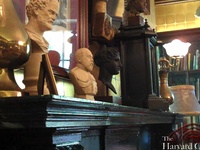“He was a Harvard icon, one of those larger than life personae that makes so rich the History of Harvard, to which he now belongs,” Andrew F. Saxe ’84, a close friend of Gomes, wrote in an email.
SHOUTS AND CHEERS
The crowd erupted in cheers as Gomes’ booming voice echoed his now famous declaration: “I am a Christian who happens as well to be gay.”
The year was 1992, and the United States was in the midst of a culture war.
Gomes’ coming out alongside other members of the faculty was a momentous occasion at Harvard—an institution in the middle of transition.
Multimedia
“[When he came out], he showed us how to be a particular kind of gay person in the world, not one that sort of conforms to stereotypes of what it means to be gay,” McCarthy said.
Although friends said that Gomes could never be limited to one part of his identity, such as his homosexuality, he did speak on the issue when his voice was most needed.
Gomes moved the audience to tears and wept himself as he delivered a sermon in 1998 after the horrific death of Matthew Shepard, a young gay man who was tortured and left to die tied to a fence in Montana, according to Lowell House Masters Diana L. Eck and Dorothy A. Austin.
Gomes stood in the spotlight in 2004 when he spoke before a crowd in the Massachusetts State House to advocate for gay marriage.
“The way to the future is always paved by extending, not restricting, liberties,” he wrote in an op-ed in the Boston Globe that year. “To extend the civil right of marriage to homosexuals will ... permit a whole class of persons both to benefit from a valuable yet vulnerable institution.”
But Gomes’ advocacy extended beyond issues of gay rights.
When the U.S. was on the verge of invading Iraq in 2003, Gomes stood in Forbes Plaza and exclaimed that the U.S. should not go to war, Austin recalled.
His outreach extended to students, who often sought his guidance in personal affairs.
Once, a student approached Gomes for advice after his parents committed suicide on separate occasions. In another instance, a student came to him for support after a friend at the College had been murdered in a fight in Boston.
“That was the worst tragedy I had ever experienced in my life,” said Robert Sackstein ’77, the student whose friend had been killed and who is now a professor at the Medical School. “He just so compassionately guided my recovery. He really pulled me through.”
Read more in News
Laughs, Nostalgia Expected at Class Day













